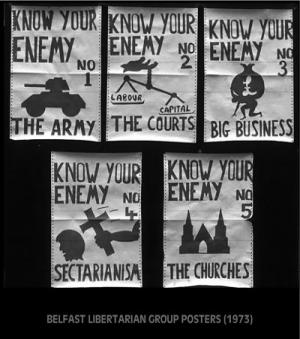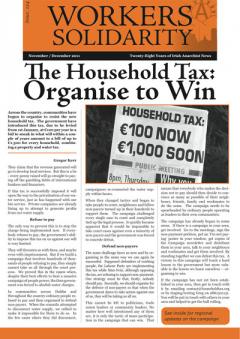Over 30 years of anarchist writing from Ireland listed under hundreds of topics
Review: A Wee Black Booke of Belfast Anarchism
Date: Wed, 2011-11-02 16:01
 Irish anarchism is a relatively new movement. We do not yet enjoy the popular understanding of anarchist ideas that can be found among thousands of militants and the wider working class in countries like Spain and Italy and across Latin America. However, this is slowly changing, partly as we begin to uncover forgotten events. This pamphlet provides a small glimpse of the history of Belfast anarchism, an idea that continues to grow, spreading the message of radical working class direct action on the streets of Belfast.
Irish anarchism is a relatively new movement. We do not yet enjoy the popular understanding of anarchist ideas that can be found among thousands of militants and the wider working class in countries like Spain and Italy and across Latin America. However, this is slowly changing, partly as we begin to uncover forgotten events. This pamphlet provides a small glimpse of the history of Belfast anarchism, an idea that continues to grow, spreading the message of radical working class direct action on the streets of Belfast.
Historian Mairtin O Cathain pulls together reports of anarchist activity in and around Belfast from 1867 to 1973. The author is clear from the outset that this is only part of the picture and more research needs to be done. The pamphlet looks at the lives of working class militants, both anarchists and those sympathetic to anarchist ideas, whose political activity merited mention in the media of the time. O Cathain’s work stops before the emergence in the late 1970s of the groups from which contemporary anarchist organisations and collectives can trace their roots such as Just Books.
Some readers of the pamphlet will be aware of Captain Jack White born in Co. Antrim, who supported workers during the 1913 Dublin lockout, later became an anarchist after participating in and witnessing the Spanish revolution in practice. Other names will be unknown to most mainstream historians and even anarchists, including Bolton Hall and William Baillie, who later emigrated to the USA. Hall was involved in communal experiments, propaganda, and union organising. Baillie was more of an individualist, though he still realised that “personal freedom was tied inexorably to collective and economic freedom.”
John McAra was a Scottish anarchist who came to speak in Belfast in the early part of the last century, where he was arrested and jailed for a few months. A small group emerged from his activity, but appears to have died away after the First World War. Jack McMullen was a public speaker with socialist with anarchist sympathies, who campaigned against slum housing and unemployment in the 1920s and 1930s.
Finally there is John McGuffin, a founder member of the Belfast Anarchist Group, who was involved in the early Peoples Democracy and the civil rights movement. From a Protestant background, John was interned and later wrote a famous book based on his own experiences called ’The Guineapigs’ which exposed the torture and abuse of prisoners by the British Government.
The pamphlet would not be completed without covering the impact of nationalism and sectarianism on the marginalisation of the left. The author touches upon these divisions amongst Irish anarchists, with a small number, such as John McGuffin, becoming sympathetic to the republican movement while others maintained a devote opposition to nationalism and armed struggle.
In 1973 the Belfast Libertarian Group released a hard-hitting booklet, “Ireland, Dead or Alive?” in which they criticised groups on the left who ‘in the excitement and action that the Irish political scene engenders’ have occasionally been swept along with the flow of events. They said this left-wing delusion was because they naturally supported those fighting the state and were lulled into the belief that the IRA were socialist and ‘working for the freedom of the people, not only in the colonial sense, but in the social and economic sense’. This is a question that is still relevant today.
This work covers an area of social history that is often neglected given the north’s competing green and orange tendencies. The author acknowledges ‘the marginal status and relative unpopularity of the movement, though people’s misconceptions about anarchism have long been a difficulty in popularising it. It nevertheless has attracted a number of extraordinary people over the years from the late nineteenth to the late twentieth century, and the message, method and spirit of anarchism has rang out in the streets and halls of Belfast at times of great social radicalism and in periods of inveterate reaction.’
Mairtin O Cathain’s ‘Wee Black Booke’ on Belfast Anarchism from 1867- 1973 can be read online at http://www.wsm.ie/c/belfast-anarchism-wee-black-booke
This article is from Issue 124 of Ireland's anarchist paper Workers Solidarity November / December 2011


